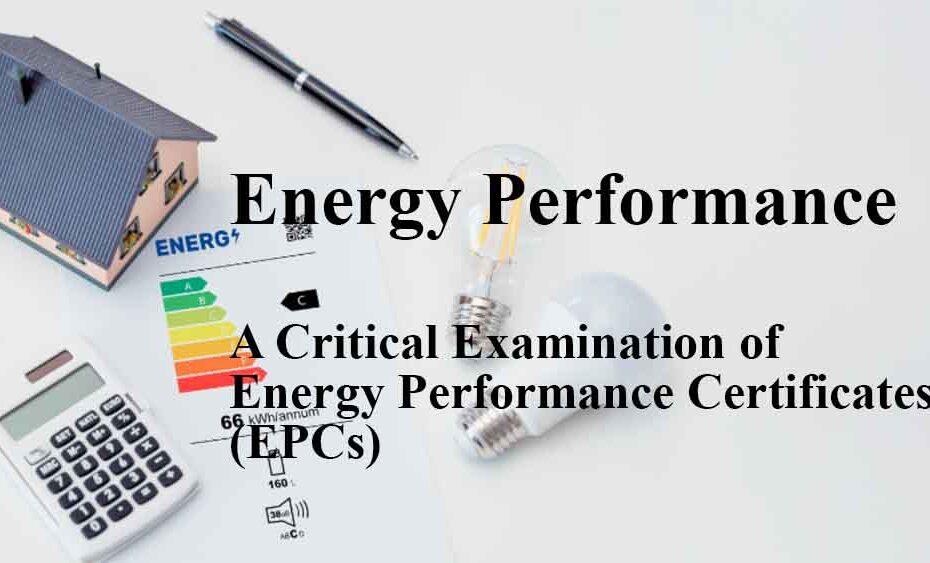A Critical Examination of Energy Performance Certificates (EPCs)
A Call for Comprehensive Transformation
**Introduction**
Amid the ongoing discourse on energy efficiency, the spotlight has shifted towards reevaluating the core principles of Energy Performance Certificates (EPCs) for private rental properties, transcending mere adjustments to set targets. The question looms: Can we reform this system, or is it time for a complete overhaul?
**Challenging the Status Quo of EPC Advocates**
Within the realm of EPCs, proponents have often clung to a conservative stance, showing reluctance to embrace substantial change. However, mounting evidence is rendering the need for reform increasingly undeniable.
**Exposing EPC Inaccuracies**
A pivotal moment arrived with The Sunday Times’ revelation of findings from meticulous research by CarbonLaces. These revelations unmasked EPCs as unreliable at best and easily manipulable at worst. The research compared EPC estimates with actual energy consumption data from smart meters, exposing a staggering 344 percent overestimation of energy usage.
**The Reality Gap: EPCs vs. Actual Energy Consumption**
Through the scrutiny of a dataset spanning over 17,000 homes, the study unveiled a stark disconnect between EPC ratings and real-world energy use. Actual metered energy consumption averaged a mere 125 kWh per square meter per year, a staggering 91 percent lower than the EPC’s claimed 239 kWh/m²/yr. The disparities were even more pronounced for lower-rated properties, with a staggering 344 percent divergence for properties with the lowest G rating.
**Beyond Energy Overestimation: Inaccurate Carbon Emissions**
The shortcomings of EPCs extended beyond energy miscalculations to inaccurate carbon emission estimates, ranging from a substantial 20 percent for EPCs rated C to an alarming 308 percent for EPCs rated G.
**Manipulation and Compliance: The Enigma of EPCs**
The CarbonLaces investigation not only exposed EPC inaccuracies but also laid bare the strategies employed by developers and contractors to secure favorable ratings. This hinted at a system more concerned with checking boxes than fostering authentic energy efficiency.
**The Deafening Silence: Acknowledging the Issue**
The conspicuous absence of credible counterarguments to this exposé implies industry-wide recognition of the deficiencies within the current EPC system. While a single investigation may not universally indict EPCs, the resounding silence tacitly endorses the issues at hand.
**Personal Experiences and Escalating Skepticism**
Personal accounts from individuals across the nation amplify the growing skepticism surrounding EPC assessments, providing real-world context to the concerns raised by the CarbonLaces study.
**Pursuing Replacement: A Daunting Task**
Replacing the current EPC system presents a formidable challenge that demands careful thought and expertise. While I may not possess the qualifications to propose an alternative, the concept of evaluating a building’s thermal efficiency during construction and sale holds promise.
**Advocating Reform: Insights from RICS**
The Royal Institution of Chartered Surveyors (RICS) has added its voice to the call for substantial changes in EPC calculations. RICS emphasizes a shift towards evaluating a property’s final energy consumption, carbon emissions, and energy costs to align better with government objectives.
**Frequent Assessments and Technological Progress**
In the midst of rapidly evolving technology, some voices, possibly influenced by vested interests, advocate for more frequent EPC assessments. The current decade-long interval may fall short in addressing the swiftly changing energy landscape.
**Necessity for Deliberate Discourse**
As the conversation on energy efficiency gains momentum, both within the industry and beyond, it is crucial to ensure that the debate remains grounded in thoughtful consideration. Knee-jerk reactions must be avoided at all costs.
**Beyond Short-Term Expediency**
In a landscape fraught with performative actions by politicians and pressure groups, driven by the desire to appear proactive without evaluating the effectiveness of EPCs, what we truly need is a comprehensive, deliberate effort to discern the purpose of EPCs and determine the most effective strategies to achieve their intended objectives.
**Conclusion: Embracing the Challenge**
Though this endeavor may be time-consuming and require substantial effort, it is imperative that we summon the energy and commitment for a comprehensive reevaluation. The lingering question is whether we are ready to undertake this crucial task. In a world filled with urgency, let us ensure that the path we chart is one of thoughtful reflection and sustainable change.

